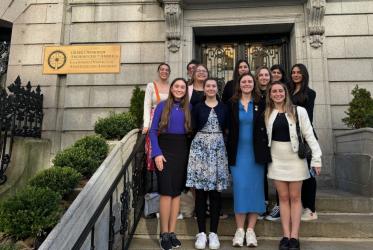The webinar—co-organized by the World Council of Churches (WCC), Church of Sweden, ACT Alliance, and the World Association for Christian Communication—was a side event of the ongoing 67th Commission on the Status of Women, which is taking place on 6-17 March in New York City.
The discussion was moderated by Dr Erin Green, a researcher and teacher who spent nearly 15 years studying the social and ecological impact of artificial intelligence. “Of course the great blessing of ecumenical fellowship and movements is that we are able to bring together so many different perspectives on any given topic,” she said.
Dr Antje Jackelén, former archbishop and primate of the Church of Sweden, and prior to that the bishop of the diocese of Lund, termed polarization “one of the curses of our time”. It was one of what she calls “the toxic Ps” of our time: polarization, populism, protectionism, post-truth, and patriarchy.
Yet amid the toxic digital soup in which we all seem to be swimming, Jackelén, noted some positive aspects of what algorithms could possibly do. “Now, the good news is that digitization holds the potential of providing a means to overcome the disastrous synergy of that toxic cocktail,” she said. “A small example: AI-powered gender decoders help employers write job postings that are more inclusive and thus increase the diversity of their workforces. That’s the good news.”
As speakers weighed in from the local contexts, many of them agreed that overcoming harmful biases online begins with overcoming them in person.
Emma Rahman, who hails from Trinidad and Tobago, is an assistant producer on a 30-minute televised programme called “Moments of Inspiration." She spoke of digital polarization as a product of the digital divide that has left people behind—yet again.
“Some people benefit from the advancement of digital technology but others are ostracized, left out, and left behind,” she said, adding that confronting our biases as individuals can help us combat online biases. “One can argue that we all have biases,” she said. “Biases make us human.”
If digitization is going to be a force for good, faith-based groups need to be equipped to use it that way, pointed out Gladys Nairuba, a programme officer with DanChurchAid in Uganda.
“There are a number of spaces that we can use as faith-based actors,” she said. “In terms of access and utilization, it is also important for us to be cognizant of the required skills to effectively use technology.”
Nairuba urged an awareness of what digital innovations may bring. “The solutions we are using in our physical space should be the same solutions we are adopting in the online spaces—and this means offering support to those affected, moderating the spaces, and ensuring as faith leaders we contribute to the local policy framework.”
One should not only begin in person but also begin in one’s own community, noted Rev. Marvia Lawes, a Caribbean womanist, historical theologian, gender specialist, and advocate for children, youth, persons living with HIV and AIDS, racial justice, and climate justice. “From a faith-based perspective, we have to start in our own communities,” she said. “We have to begin offline because what we see online is a reflection of what we see offline.”
Dr Matthew Robinson, leader of the Theological Digital Communication Hub and director of the Intercultural Department at the Protestant Theological Faculty at Bonn University, expressed gratitude for all the speakers who were from a diverse array of contexts. He candidly shared that sometimes he feel a lack of hope for how little involvement and influence churches seem to have over online algorithms. “But the good news is, that’s not where the trouble starts anyway—it’s not where its roots lie,” he said.
Concluding the webinar, Amanda Strydom, senior programme manager for Code for Africa's CivicSignal, a programme that uses machine learning tools to monitor the way media reports on topics of interest, concluded the webinar by offering an array of practical tools to help people prevent gender-based abuse and other forms of harassment online.
Having a plan for when harassment occurs is important, Strydom urged. “Is everyone going to have a standard response that they’re going to give, possibly, or is there an idea of shutting down and not responding to trolls? Really having that plan in place means you can physically prepare for it as well as mentally prepare yourself and the support network you have with you.”
She cited a survey in which more than 60 percent of advocates or journalists indicated that they are a target of gender-based harassment. “It means that your personal protection needs to be so much stronger,” she suggested. “One example—and quite an obvious one—is setting up two-factor authentication on all our accounts.”
We’ve heard over and over today the importance of community and forging connections, and you can see among us hear the connections we are making.
In summarizing the conversation, Dr Green highlighted the recurring points of “scrutinizing power” and cultivating community. “We can’t take this all on ourselves. It is important as the AI discourse gains traction that in the church we make connections and that we draw strength in numbers so that we see this not as an individual project, but the work of the church itself.”
As Dr Jackelén emphasized, “This is indeed time for joint transdisciplinary reflection on how AI develops and will affect people’s lives, societies around the world, and the planet as such.”







